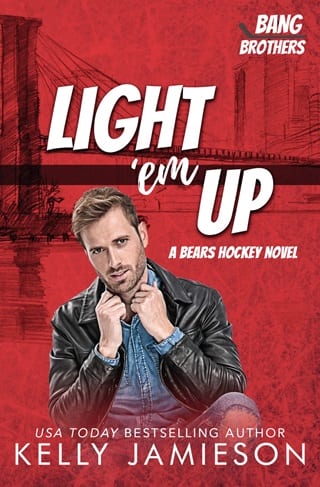Chapter 15
FIFTEEN
Logan
After a practice at a nearby arena, we have lunch back at the resort and then it's time for the dreaded teambuilding activities. First we do a game to find out how well we know our teammates. We're given a bingo card with things like "speaks more than one language," and "has the same number of siblings as you." We have to mill around and find someone who meets each of those categories. Some are easy—I head straight to Axe, who obviously speaks Swedish and English. Also, I know Beav is an only child, like me.
"Do you play piano?" I ask Millsy.
"Nope."
"Guitar?"
He shakes his head. "I'm not musical at all."
"Shit." We move around asking questions.
I come face to face with Annie. We've been trying to avoid each other. I immediately remember making her come in the hot tub last night and my blood heats.
"You don't have five siblings," she says in a resigned tone.
"No."
She sighs. "I'm the only one here with five siblings. How am I going to win this?"
I repress a smile. "I don't think it's actually a competition."
Our eyes meet in a flurry of sparks.
Her lips twitch. "Right."
I peer at her paper. "But I do have a unique talent."
"Oh, yeah, what is it?" Then her expression turns wary. "And please don't tell me it's something sexual. One of the guys already tried to tell me he can suck his own, uh…"
I choke. "Jesus." I scowl. "I have a dirty mind but even I wouldn't say something like that to you." I look around for Snake, knowing it was him. Do I have to talk to him again? "My talent is juggling."
She brightens. "Okay!" She marks down my name on that square. "What do you still need?"
"Have you ever bungee jumped?"
"Oh yeah, I have."
I give her a look, then write her name down. "Wow. Brave girl."
"I guess you haven't seen me skating." With a breezy smile, she moves on.
Oh yeah, I've seen her skating. I know she said that for the benefit of the others around us. And I guess I shouldn't be surprised that she's bungee jumped, after how I saw her being thrown up in the air to spin several times.
After this, Coach gives us a talk about the kind of team we want to be this year. He brings up mental toughness again. And that leads to the next activities, where we work through things we can control and things we can't control and drives home how trying to control the uncontrollable leads to increased stress and frustration, as well as decreased levels of performance. There's a lot of discussion about some of the factors and it's actually pretty cool. The next one makes me want to roll my eyes at first, because we have to act out different "skills"—like reacting to a bad call, taking a cross check, turning over the puck, facing the media after a loss. We're told to think of ourselves as Hollywood actors playing the role of hockey players, and we talk about how we want to act: confident, relaxed, focused.
Some of the guys get right into it, like they're looking for an Academy Award, leading to a lot of laughter, and in the end it does make me realize how much better I can prepare for pressure situations and how acting like I'm calm about getting slashed can stop me from reacting in a bad way and maybe taking a stupid penalty.
After dinner, we all gather in a breakout room where chairs have been arranged in a semi-circle around three seats at the front of the room. Millsy, Hellsy, and Morrie take those three seats and our GM Brad introduces them, telling us they're going to talk about the tragedy that happened in their lives, how they dealt with it, and the things they learned from it.
Most of us know what happened to them. About nine years ago, they were playing major junior hockey in Canada, all on the same team, when their team bus crashed on the way to a game. But they share details most of us don't know or have forgotten.
"Fourteen people died," Millsy says. "Including my brother and my dad. My dad was an assistant coach."
"Our coach also died," Hellsy adds. "Our bus driver died, a guy from the local radio station died, and our athletic therapist died. And nine players died."
"Some of us were injured," Morrie adds. "And not just physically. Hellsy spent months in the hospital and rehab. He wasn't sure he'd ever play again. My injury was psychological. I had PTSD. And that was hard because a lot of people feel like if they can't see your injury, you're fine." He pauses. "I wasn't fine."
The room feels like a funeral, the air dense and silent as they talk. I slide a glance over to the Heller brothers, all sitting in chairs against one wall. They arrived late this afternoon and had dinner with us. Tag Heller is Hellsy's dad. He rubs his mouth as he listens, his eyes red, and his three brothers wear identical expressions of sadness. That must have been hell for that family to go through.
Morrie tells us about his therapy, Hellsy about his rehab. Then they talk about how they let each other down. They were best friends before the accident. They were all supposed to be drafted that spring. But the accident ripped that all apart.
"What was really our downfall was our inability to talk about our feelings," Hellsy says. "Or to even admit our feelings. I felt like I'd been abandoned by my friends, but I had no idea what Morrie was going through. Or Millsy. Even though he wasn't injured, his brother and his dad had just died, and his mom checked out. He was trying to hold things together, even though he'd been through hell."
"If only we'd been able to talk to each other about what was going on, we might have recovered a lot quicker," Millsy says. "Not that you ever really recover from something like that."
"That was part of the reason for us starting Play Well," Hellsy says, referring to the organization the three of them started to bring attention to mental health issues. "You guys know about it and we've appreciated your support."
There's a lot of nodding in the room.
"The specific reason we're talking to you about this now is to remind us all how important it is to acknowledge how we're feeling. There are a lot of ups and downs over the season. Shit is going to happen. Guys are gonna get injured, we're gonna lose games, and stuff's gonna happen in our personal lives. As a team, we want to be mentally tough. But what does that mean?" Morrie looks around at us.
"Men are conditioned to think that showing our feelings is weakness," Millsy says. "We're taught that asking for help is weakness. And we just did some role playing where we saw times it's not good to show your feelings. On the ice we need to stay in control. But off the ice…we need to talk about shit. If we screw up, talk about it. If we're pissed, talk about it. If something's going on in your personal life, talk about it. It's not weak. We want men to know that being able to ask for help is a sign of confidence. Masculinity. Strength. Opening up and talking about it is the biggest, bravest step you can take."
"Let's be there for each other," Hellsy adds. "We all need to know that we don't have to handle our shit alone. When someone's struggling, let's help each other out. Sometimes all it means is listening. You don't have to solve the problem. You don't have to make things better. Just listen. Listening without judgment is huge ."
"Another thing we learned from what we went through is that you have to do the work." Morrie looks around at us. "We can't just play hockey and hope to make the playoffs. Or hope we're going to win the Stanley Cup. You can't just hope. You have to believe in it. You have to take the risks, and it's fucking scary. But it's worth it."
My chest is full and fizzy. I look around the room and see the sober expressions on my teammates faces. And then my gaze lands on Annie. Her face is soft, eyes glossy, lips pouty. She's as affected as the rest of us. Did that resonate with her, too? She's not a guy— definitely not—but I have a feeling she keeps her emotions pretty tightly wrapped. She seems controlled. Cool. Confident.
But I've seen hints of her vulnerabilities. I've seen her let loose. Come apart. Shatter.
I shift in my seat.
Coach stands up to wrap up the evening and tells us to head to the bar or whatever we want to do as long as we're at the bus at nine o'clock for one more practice before we head back to the city. As we all rise to leave, Tag Heller walks over to his son and wraps his arms around him in a hug.
I swallow, my throat suddenly scratchy.
And then I meet Annie's eyes, glowing blue and full of feeling. As we move with the others toward the door, our steps bring us together. As much as we try to stay apart and not look at each other, it's futile. There's an energy that flows between us, some kind of gravitational pull.
"That was powerful," she says quietly.
"Yeah."
I think about the things they said for a long time after I get to my room later. It all sounds good, but how can I buy into that? That's not how I was raised.
My dad played pro hockey. He wasn't the most talented player, but he was big and strong and physical and he ended up in the role of an enforcer. He played with Joe Bready, a super star back in the day whose records for most goals in a season and most assists in a career still stand. It was Dad's job to protect him, and he did it with zeal.
Dad wasn't that involved in my hockey when I was a little kid because he was still playing, but after he retired because his body basically gave out after playing that hard for years, he turned into a classic hockey parent, at the rink all the time, yelling at the coaches and the refs. People let him get away with it because of who he was, but I hated it.
As I got older, his constant feedback to me was "be tougher." Take the man out. Hit 'em hard. Drop the gloves.
I hated it. But more than that, I hated disappointing him. Because when I didn't play like that, Dad was pissed. Distant. Disapproving. As a kid, that's hard. Fucking hard. It's scary.
So I tried to do what he wanted.
I sure as hell didn't cry when I got hurt. I didn't complain about cuts and bruises and raw knuckles. I pretended I loved it all. I learned that emotions make you weak. That unless I played "the right way" I didn't deserve to be loved. That I wasn't good enough.
So all this talk about acknowledging our feelings, talking things out…that is not going to happen for me. I have a goal this year. My worth as a player—hell, as a person—is tied to being the best hockey player I can be. My dad will always see me as not good enough, so fuck it, I don't care what he thinks. I'm going to focus on things other than aggressive hits and try to be the best I can be. For me. For the team.
 Fullepub
Fullepub 



